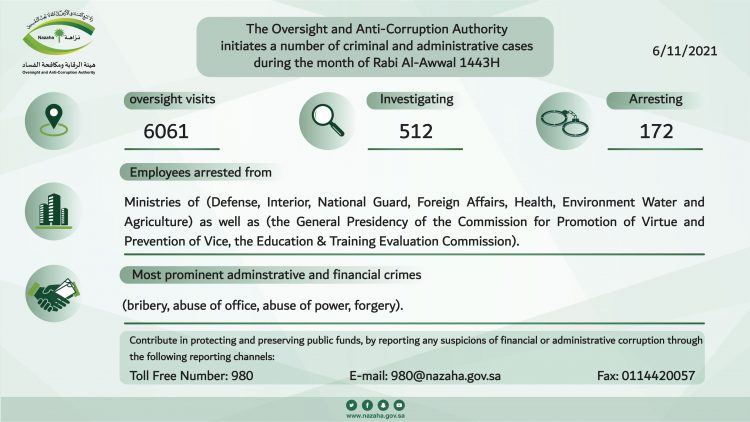Publisher: Maaal International Media Company
License: 465734
NAZAHA Investigated 512, Arrested 172 in Administrative & Criminal Cases In Month
Saudi Oversight and Anti-Corruption Authority (NAZAHA) said in a statement on Saturday that it investigated (512) defendants in administrative and criminal cases, and the arrested of (172) citizens and residents.
NAZAHA said statement that among those arrested were; Employees in the Ministries of Interior, National Guard, Defense, Water, Agriculture and Health, the Education and Training Evaluation Commission, and the General Presidency of the Commission for the Promotion of Virtue and the Prevention of Vice.
“They were involved in cases of bribery, abuse of office, abuse of power and forgery.” It said.
اقرأ المزيد
According to the statement, legal procedures are currently being completed in preparation for their referral to the judiciary.
The Kingdom of Saudi Arabia has achieved several successes at the local and international levels in the anti-corruption field, thanks to the leadership’s interest and concern for this sector, which is reflected through the unlimited support to the Oversight and Anti-Corruption Authority (Nazaha) in a bid to enhance efforts aimed at protecting integrity and fighting corruption.
Saudi Vision 2030 has been keen to highlight the importance that the leadership has granted to anti-corruption efforts and enhance transparency and integrity principles to be among main factors necessary to realize the vision that came to reiterate the significance of adopting transparency as an approach for the country, stressing the lack of tolerance with all forms of corruption.
The Kingdom of Saudi Arabia, under the reign of the Custodian of the Two Holy Mosques King Salman bin Abdulaziz Al Saud and His Royal Highness Prince Mohammed bin Salman bin Abdulaziz Al Saud, Crown Prince, Deputy Prime Minister and Minister of Defense, now has an anti-corruption roadmap that acts as a main pillar for Saudi Vision 2030 that aims at implementing reforms at all levels and limiting the risks of corruption threats.
The Kingdom of Saudi Arabia is working hard to eliminate financial and administrative corruption, instilling the principles of transparency and justice, and economic reforms in a way that guarantees efficiency, protecting public money, realizing social and economic stability, enhancing investors’ confidence, and continuing to improve the Kingdom of Saudi Arabia’s ranking in international classification related to integrity, transparency and anti-corruption.








